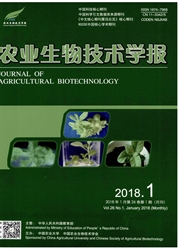

 中文摘要:
中文摘要:
巨噬细胞产生的一氧化氮(nitric oxide,NO)在抵御及杀灭病原微生物过程中起重要作用。为了解哺乳动物雷帕霉素靶蛋白(mammalian target of rapamycin,mTOR)信号通路在结核分枝杆菌(Mycobacterium tuberculosis,MTB)感染宿主巨噬细胞过程中对NO的调控作用,本研究在卡介苗(Bacillus Calmette—Gurrin,BCG)感染体外培养的BALB/c小鼠(Musmusculus)巨噬细胞系RAW264.7过程中添加mTOR信号通路的特异性抑制剂雷帕霉素(rapamycin),通过Griess、实时荧光定量PCR、Westernblot等方法检测NO及诱导性一氧化氮合成酶基IN(inducible nitric oxide synthase,iNOS)mRNA及其蛋白的表达情况,同时以脂多糖(1ipopolysaccharides,LPS)处理的RAw264.7细胞作为参照。结果表明,与未经处理的空白对照组相比,BCG、LPS刺激6、12和24h可以极显著增加RAW264.7细胞中NO的产生(P<0.01),iNOS mRNA及其蛋白水平表达极显著增加伊〈0.01)。与未添加rapamycin组相比,BCG感染6和12h时,10nmol/Lrapamycin可以极显著抑制RAW264.7细胞中NO的产生及iNOS的表达(P<0.01),但24h时rapamycin对产生NO的抑制作用不显著(P>0.05),但同样可以极显著抑制iNOS的表达(P<0.01);LPS刺激6和24h时,10nmol/Lrapamycin可以极显著抑制RAW264.7细胞中NO的产生(P<0.01);12h时,显著抑制NO的产生(P<0.05);LPS刺激时,6h时rapamycin对iNOS的表达的抑制作用不显著fP〉0.05),12和24h时极显著抑制iNOS的表达(P<0.01)。结果显示,rapamycin在MTB感染宿主巨噬细胞过程中对NO的产生有重要的调控作用,为揭示mTOR信号通路在结核病发生及发展过程中的作用提供重要的理论依据。
 英文摘要:
英文摘要:
Nitric oxide(NO) produced by macrophages plays a crucial role in the process of resisting and killing pathogenic microorganisms. In order to demonstrate the effect of mammalian target of rapamycin (mTOR) signaling pathway on NO in the process of host macrophages infected by Mycobaeterium tuberculosis, BALB/c mouse (Mus musculus) macrophage cell line RAW264.7 was infected by Bacillus Calmette-Guerin(BCG), which were cultured in the presence of mTOR specific inhibitor rapamycin. The production of NO and the mRNA and protein expression of inducible nitric oxide synthase (iNOS) were detected by the methods of Griess, qRT-PCR and Western blot, meanwhile the lipopolysaccharide (LPS) was used as reference. The results showed that the production of NO was significantly increased in the RAW264.7 cells which were treated by BCG and LPS for 6, 12 and 24 h compared with the untreated control group, the expression levels of mRNA and protein of iNOS were extremely significantly increased (P〈0.01). The production of NO and the expression of iNOS were extremely significantly inhibited by 10 nmol/L rapamycin after BCG infection for 6 and 12 h (P〈0.01) compared with the control group; however, after infection for 24 h, the inhibition effect by rapamycin was not significant (P〉0.05), but the expression of iNOS was extremely significantly inhibited (P〈0.01). Moreover, after the RAW264.7 cells were treated by LPS for 6 and 24 h, 10 nmol/L rapamycin could extremely significantly inhibit the production of NO and the expression of iNOS (P〈 0.01); the production of NO was significantly inhibited after the treatment for 12 h (P〈0.05). Further more, when the cells were treated by LPS for 6 h, the inhibition of rapamycin on the expression of iNOS was not significant difference (P〉0.05), but extremely significant difference after treatment for 12 and 24 h (P〈0.01). The present findings showed that rapamycin has important regulation effect on the production of NO in the p
 同期刊论文项目
同期刊论文项目
 同项目期刊论文
同项目期刊论文
 期刊信息
期刊信息
